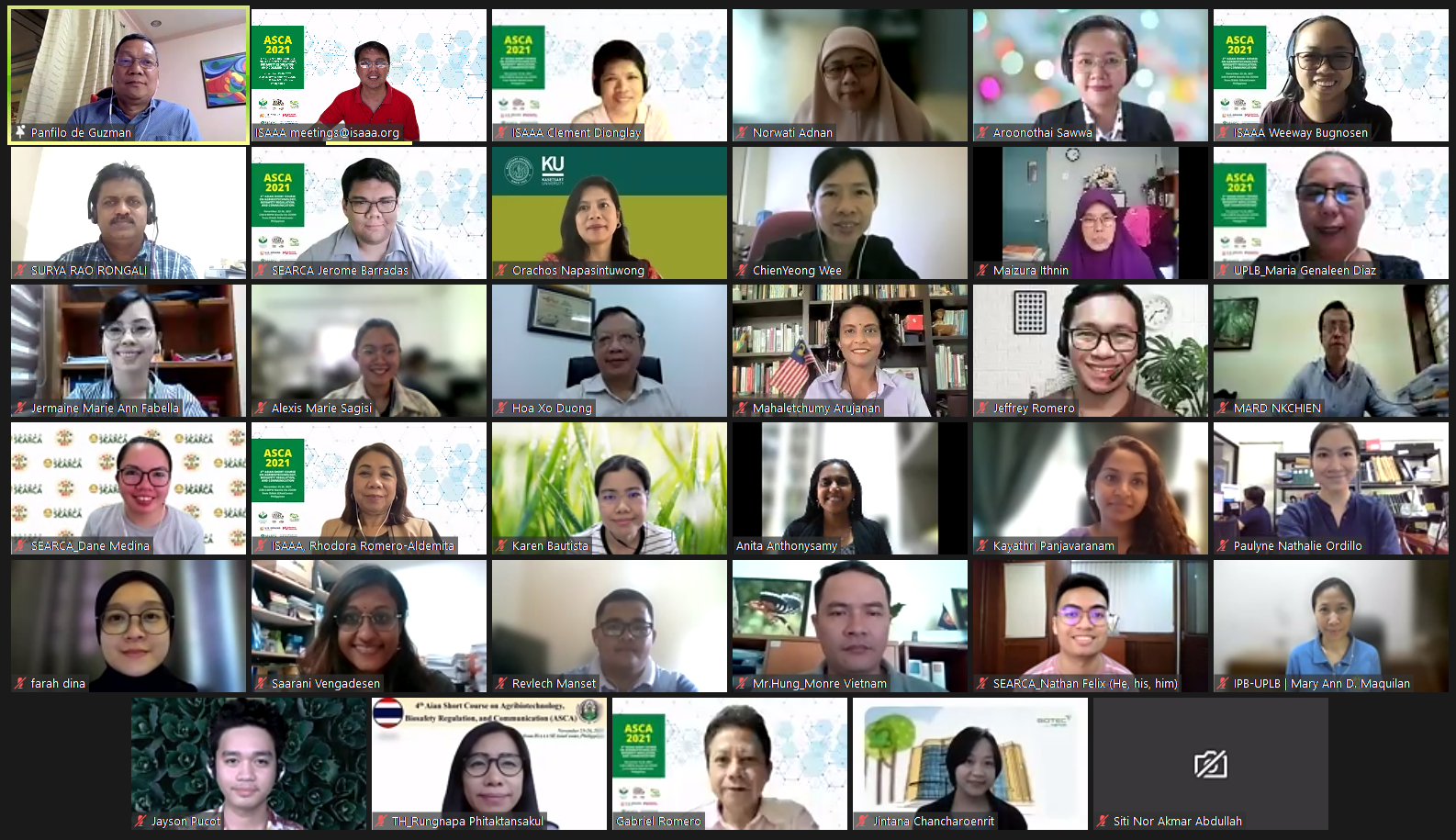
ISAAA Asian Course Tackles Value Chain of LMOs, Biosafety Regulations, and Communication
December 1, 2021| |
The 4th Asian Short Course on Agribiotechnology, Biosafety Regulation, and Communication (ASCA 2021) was held from November 23-26, 2021 via Zoom. The event, which was first held in 2018 in Malaysia, accommodated 48 participants from nine countries that included the Philippines, Malaysia, Thailand, Vietnam, China, Ghana, Democratic Republic of Congo, Brazil, and India. The course attracts participants who are interested in engaging in discussions about the recent developments on the topics of modern biotechnology, particularly genetic modification (GM) and gene editing (GEd).
The participants were composed of regulators, technology developers, and researchers from both the public and private sectors, and members of the academe as either faculty or student. The event was made possible through the combined efforts of ISAAA, the Southeast Asian Regional Center for Graduate Study and Research in Agriculture (SEARCA), Malaysian Biotechnology Information Centre, United States Export Soybean Council, United States Grains Council, Outreach Network for Gene Drive Research, and Murdoch University.
The program was opened with messages from Deputy Director Joselito Florendo of SEARCA and Dr. Mahaletchumy Arujanan, ISAAA Global Coordinator. Dr. Rhodora Romero-Aldemita, ISAAA SEAsiaCenter Director, gave the overview of the course. ISAAA and SEARCA personnel served as moderators and rapporteurs throughout the course.
This year's course was comprised of the different stages of developing a modern biotech product to raising the beneficiaries' awareness of the technology, products, and benefits. The course was composed of six sessions starting with an overview of the genetic modification and gene editing technologies, the global status of biotech crop and animal technologies and products and the international gene editing policies that accompany the technology. There was also a session that provided the opportunity for the participants to give a short briefer of the biotech status of their respective countries. Representatives from the Philippines, Malaysia, Thailand, Democratic Republic of Congo, Ghana, and India were selected to give a short presentation about the current legislation and regulations in their respective countries to guide the development and commercialization of modern biotech crops.
Resource persons also shared their experiences in developing and commercializing a GM product, specifically Golden Rice and Bt eggplant in the Philippines and the drought tolerant sugarcane in Indonesia were cited. The topic was reinforced by a discussion on how the collaboration among the academe, the industry, and the government can help deliver the modern biotechnology products to their intended beneficiaries. Afterwards, related topics such as the Cartagena Protocol on Biosafety, synthetic biology, digital sequence imaging, and gene drive technology were tackled.
The economic and market impacts of modern biotech crops were also talked about, specifically the economic impacts of biotech regulations based on experiences of different countries in different regions of the world and the regulatory asynchrony and impact on trade of low-level presence of modern biotech products. The last session was on science communication and science diplomacy, which introduced a workshop that allowed the participants to simulate the discussions and negotiations that occur during COPMOP meetings in the Convention of Biological Diversity.
The 4-day course ended by asking selected participants to give their impressions, share what they learned, and give suggestions for future events. These were followed by closing message from Dr. Romero-Aldemita and an invitation to participate in another ASCA in 2022 hopefully through a face-to-face setting.
For more information about ASCA, contact knowledge.center@isaaa.org.
| |
You might also like:
- ISAAA Short Course Highlights Relevance of Integrating Research, Science-based Regulation, and SciCom in Sustainable Agri Dev't
- Asian Course Tackles Importance of Integrating Research, Effective Communication and Science-based Regulation in Agribiotech
- Science Diplomacy: Science-based Legislations for the Advancement of Research
Biotech Updates is a weekly newsletter of ISAAA, a not-for-profit organization. It is distributed for free to over 22,000 subscribers worldwide to inform them about the key developments in biosciences, especially in biotechnology. Your support will help us in our mission to feed the world with knowledge. You can help by donating as little as $10.
-
See more articles:
-
News from Around the World
- Report Highlights Alarming Increase of Hunger in Latin America and the Caribbean
- US Lawmakers Urge Biden to Enforce USMCA Compliance on Biotech
- Popular Pearl Millet Hybrid Improved through Genomics-Assisted Breeding
- APEC Workshop Aims to Bridge Gaps with Scicom
- Australian OGTR Invites Public Comments on GM Wheat and Barley Field Trial
- Biotechnology Approaches in Crop Improvement in Thailand: Genetic Engineering and Genome Editing
- ISAAA Asian Course Tackles Value Chain of LMOs, Biosafety Regulations, and Communication
- Scientists Discover Barley Gene Has Resistance to Different Pathogens
-
Research Highlights
- Researchers Boost Lysine Content in Camelina Seeds
-
Plant
- Scientists Produce New Antibiotics Using CRISPR-Cas9
- Guidelines Expanded for Arthropod Gene Drive Research
- Study Shows a Donor-DNA-free CRISPR-Cas-based Approach to Gene Knock-up in Rice
-
Read the latest: - Biotech Updates (January 14, 2026)
- Gene Editing Supplement (December 17, 2025)
- Gene Drive Supplement (February 22, 2023)
-
Subscribe to BU: - Share
- Tweet

